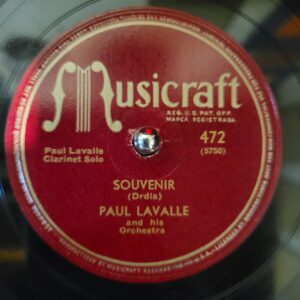Vintage Music Label of the Week: Musicraft
Welcome to this week’s edition of “Vintage Music Label of the Week,” where we dive into the rich history and cultural significance of legendary record labels that have shaped the music landscape. This week, we shine the spotlight on Musicraft Records, a label renowned for its influential contributions to the jazz and popular music scenes during the mid-20th century.

Musicraft Records was established in 1937, during a time when the recording industry was experiencing significant transformation. The label was founded by John Hammond, an influential music producer and talent scout known for his keen ear for emerging talent. Alongside Hammond, other key figures such as Rosalie Beer and Truman Young played crucial roles in the company’s early development. Musicraft’s mission was to produce high-quality recordings of jazz and popular music, catering to a growing audience of enthusiasts seeking sophisticated and innovative sounds.
Throughout the late 1930s and into the 1940s, Musicraft Records experienced substantial growth, carving out a niche for itself in the American music industry. It was home to a roster of remarkable artists who significantly shaped the label’s identity and legacy, including the legendary jazz vocalist Sarah Vaughan. Vaughan’s career took off with Musicraft, where she recorded some of her earliest and most influential tracks, showcasing her extraordinary vocal range and emotive power. Another prominent artist was Charlie Parker, a pioneering bebop saxophonist whose innovative style and virtuosic performances left an indelible mark on the jazz genre. Additionally, Dizzy Gillespie, a trumpeter and bandleader known for his complex compositions and energetic performances, contributed to Musicraft’s prestige.
Among the many recordings released by Musicraft, certain tracks stand out for their groundbreaking nature and enduring popularity. Sarah Vaughan’s rendition of “Lover Man” is a prime example, highlighting her ability to convey deep emotion through her powerful voice. This track remains a jazz standard, beloved by both audiences and musicians alike. Charlie Parker’s recordings with Musicraft, such as “Relaxin’ at Camarillo,” capture the essence of bebop and have been highly influential in the development of modern jazz. Dizzy Gillespie’s “Manteca,” co-written with Chano Pozo, introduced Afro-Cuban rhythms to a broader audience and marked a significant evolution in jazz. These recordings had a profound impact on the music scene, shaping the direction of jazz and popular music in the mid-20th century. For instance, Sarah Vaughan’s work with the label helped establish her as one of the foremost vocalists of her time, influencing countless singers who followed. Charlie Parker and Dizzy Gillespie’s contributions to bebop through their Musicraft recordings played a crucial role in the genre’s development, encouraging other musicians to explore new harmonies, rhythms, and improvisational techniques. These artists and their iconic recordings helped propel jazz into a new era, broadening its appeal and solidifying its place in American culture. Musicraft’s willingness to support and promote such innovative artists underscores its significant role in music history.
Early successes and influential catalog notwithstanding, Musicraft Records faced numerous challenges that led to its decline. The post-World War II era brought significant changes to the music industry, including the rise of larger record companies with more substantial financial resources and advanced distribution networks. Musicraft struggled to compete with these industry giants, leading to financial difficulties. Additionally, the advent of new recording technologies and changing musical tastes put pressure on the label to adapt quickly, which proved challenging for its limited resources. A major blow came when key artists, seeking better opportunities and greater financial stability, began to leave the label. By the late 1940s, these factors culminated in Musicraft’s inability to sustain its operations, marking the end of its prominence in the music industry.
Despite its decline, Musicraft Records left an enduring legacy that continues to resonate within the music industry. The label’s commitment to high-quality recordings and its role in the careers of iconic artists like Sarah Vaughan, Charlie Parker, and Dizzy Gillespie have cemented its place in music history. Musicraft’s pioneering efforts in jazz and popular music are still celebrated by contemporary artists and music historians, who view the label as a key contributor to the evolution of these genres. The recordings produced by Musicraft remain influential, studied for their artistic and technical achievements. Today, Musicraft is remembered as a trailblazer that, despite its eventual decline, played a crucial role in shaping the sound of mid-20th-century music, leaving a legacy that continues to inspire and educate future generations.
